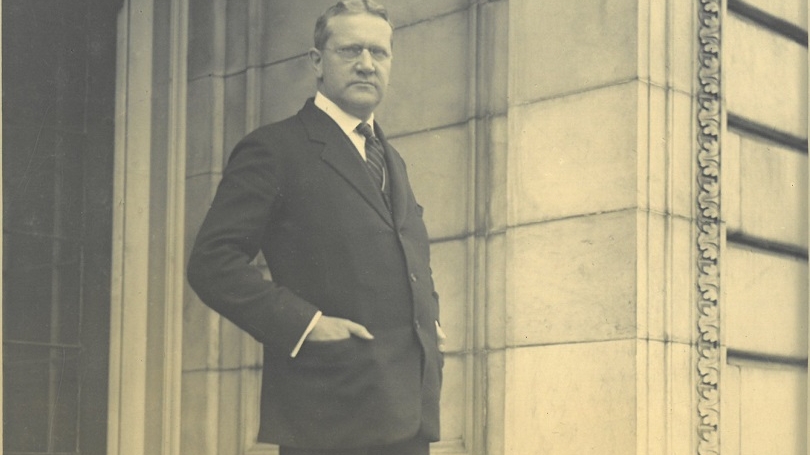
- Public Policy
- Leadership
- Funding
- News & Events
- About the Center
Back to Top Nav
Back to Top Nav
Back to Top Nav
Back to Top Nav
This article is part of a series recognizing Dartmouth Alumni who have served in public office and demonstrated their commitment to the ideals of public service, leadership, and civic engagement.
Few senators are entrusted with the range of leadership positions George Higgins “Mose” Moses (R-NH) attained during his fifteen years in public office. Born in Maine but an adopted son of New Hampshire, Moses gained a reputation in the Granite State through devotion to local journalism and unwavering support for the state’s Republican Party. Fluent in French and Greek with a skillful command of text-book Latin, even his detractors characterized him as the most gifted classical scholar to graduate from Dartmouth by 1890.
George Moses entered Dartmouth in 1887 as a sophomore after attending Phillips-Exeter Academy and was a member of the Psi Upsilon Fraternity. Over the next three years, Moses gained a reputation for being a sharp, opinionated force in classroom discussions. Only a junior, he would serve two years as the private secretary to Governor David Goodell (R-NH), gaining the attention of Senator William Chandler (R-NH)—owner of the daily Concord Evening Monitor, an on-going newspaper publication.
In 1892, George Moses joined the Monitor as a reporter on local politics. Moses worked his way to news editor and eventually chief editor of the paper, buying the Monitor-Statesman Company outright on credit eight years later in a partnership with Senator Chandler’s son. Moses became president of the company, a position he held for almost twenty years. Meanwhile, he also served passionately as secretary and sitting member of New Hampshire’s Forestry Commission from 1893-1907.
George Moses became well-known in Republican circles as a promising statesman, working for several campaigns and serving as a delegate from New Hampshire to the 1908 Republican National Convention. In 1909, newly-elected President Taft, a fellow Psi Upsilon, appointed Moses as US Minister to Greece and Montenegro. Moses wrote several pieces that were published in National Geographic magazine about the region’s cultures and historic racial tensions and received awards for distinguished service.
Back at home in New Hampshire upon the election of President Woodrow Wilson (D), George Moses went to work on Dartmouth alumnus Senator Jacob Gallinger’s (R-NH) 1914 reelection campaign. Senator Gallinger, New Hampshire’s first directly-elected senator after the passage of the 17th Amendment, aided Moses in mounting a campaign to fill the other New Hampshire senate seat. When Senator Gallinger passed away during the height of the campaign, Moses filed to instead fill his vacancy in a special election that he would narrowly win.
Like he entered Dartmouth as a prepared sophomore, George Moses entered the senate as an accomplished political leader. His knack for oral argument on the senate floor only solidified his colleagues trust in his ability. Reelected at the end of Senator Gallinger’s term in 1920, and then again in 1926, Moses would spend fifteen years representing the state of New Hampshire in the US Senate. In that time, he attained chairmanship of committees normally reserved for the most senior senators: the Committee on Rules, the Committee on Post Office and Post Roads, and the Committee on Printing. Moses would spend his last term as President pro tempore of the Senate, 1925-1933.
However, Senator George Moses’ crowning moment came from his time as a sitting member on the Committee on Foreign Relations during consideration of the Treaty of Versailles. Deeply at ideological odds with President Wilson and immensely skeptical of the terms of the agreement, on July 22, 1919, Moses delivered a powerful dissenting speech against the League of Nations on the Senate floor that swayed a number of his colleagues. The Treaty of Versailles was the first peace treaty to fail senate ratification, 39-55.
Throughout his public service, Dartmouth remained a central part of Moses's life. He would return often to campus to give lectures ranging from deforestation to the legislative functions of the senate. In honor of Professor James Fairbanks Colby—a close friend of his that served alongside him on New Hampshire’s Forestry Commission—Moses established the $500 annual James Fairbanks Colby Prize for Achievement in Political Science, which is given in the form of books to graduating students who show potential for public service. During his last bid for reelection, famed Dartmouth President Ernest Hopkins publicly endorsed Moses over his Democratic opponent and fellow Dartmouth alumnus, Fred Brown. However, a victim to Franklin Roosevelt’s New Deal election wave, Moses would still lose his final campaign to his challenger.
George Moses tried twice to reclaim his seat, failing on both occasions. After accepting his retirement from the senate, he returned to journalism in New Hampshire. Moses continued to be a source of counsel for the state’s Republican party and a frequent lecturer at Dartmouth until his death in 1944. Moses’ son, Gordon Moses, went on to attend Dartmouth College after graduating from the US Naval Academy.
Submitted by Ian Michael Reed '21, Student Researcher for the Dartmouth College Public Service Legacy Project.